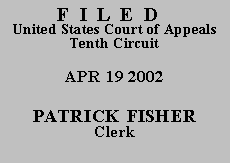

| JOHNATHAN HARMON, |
|
Before BARRETT, PORFILIO, and
BRORBY, Senior Circuit Judges.
After examining the briefs and appellate record, this panel has determined
unanimously that oral argument would not materially assist the determination of
this appeal. See Fed. R. App. P. 34(a)(2); 10th Cir. R. 34.1(G). The case is
therefore ordered submitted without oral argument.
Johnathan Harmon, a state court prisoner appearing pro se, appeals the district court's dismissal of his habeas corpus petition filed pursuant to 28 U.S.C. § 2254. We deny Mr. Harmon a certificate of appealability, dismiss his appeal, and grant his motion to proceed in forma pauperis.
A jury convicted Mr. Harmon of possession of cocaine after a former felony conviction in violation of Okla. Stat. tit. 63, § 2-402. In accordance with a jury recommendation, the state court sentenced Mr. Harmon to twelve years imprisonment. On appeal, the Oklahoma Court of Criminal Appeals affirmed Mr. Harmon's conviction.
Thereafter, Mr. Harmon filed a pro se application for state post-conviction relief in federal district court claiming: (1) the trial court improperly refused to suppress evidence of cocaine base seized in violation of the Fourth Amendment; (2) there was insufficient evidence to prove knowing and intentional possession of cocaine; and (3) the trial court plainly erred when it gave jury instructions modifying the first element of the charged offense from the conjunctive knowing and intentional to the disjunctive knowing or intentional. The district court referred the petition to a magistrate judge, who issued a lengthy Report and Recommendation. The magistrate judge analyzed Mr. Harmon's Fourth Amendment claim, concluding he had a full and fair opportunity to litigate it in state court. The magistrate judge reviewed the evidence presented at trial and concluded the record supported the Oklahoma Court of Criminal Appeals' determination of sufficient evidence. And, the magistrate judge carefully reviewed the trial court's jury instructions and concluded they neither misstated the applicable law nor rendered Mr. Harmon's trial fundamentally unfair. Accordingly, the magistrate judge recommended denying habeas relief. After reviewing the entire record, the magistrate judge's report, and Mr. Harmon's objections to the report, the district judge concurred and adopted the magistrate judge's Report and Recommendation.
Mr. Harmon requests we issue a certificate of appealability on the three issues raised in his district court habeas petition. To be entitled to a certificate of appealability, Mr. Harmon must make "a substantial showing of the denial of a constitutional right." 28 U.S.C. 2253(c)(2). Because the district court rejected his claims on the merits, Mr. Harmon must demonstrate that "reasonable jurists would find the district court's assessment of [his] constitutional claims debatable or wrong." Slack v. McDaniel, 529 U.S. 473, 484 (2000). Upon review of Mr. Harmon's briefs and contentions, the magistrate judge's Report and Recommendation, and the entire record on appeal, we conclude that the district court's resolution of Mr. Harmon's petition is not fairly debatable among reasonable jurists.
Mr. Harmon requests a certificate of appealability on (1) whether trial errors and prosecutorial misconduct deprived him of a fair trial and due process rights and resulted in an excessive sentence, and (2) whether the district court's acceptance of the magistrate judge's Report and Recommendation was clearly erroneous. "Because we will generally not consider issues raised on appeal that were not first presented to the district court," we do not address these issues. Rhine v. Boone, 182 F.3d 1153, 1154 (10th Cir. 1999), cert. denied, 528 U.S. 1084 (2000).
For this reason, Mr. Harmon's application for a certificate of appealability is denied and his appeal is DISMISSED. Mr. Harmon's motion to proceed in forma pauperis is granted.
Entered by the Court:
WADE BRORBY
United States Circuit Judge
*. This order and judgment is not binding precedent except under the doctrines of law of the case, res judicata and collateral estoppel. The court generally disfavors the citation of orders and judgments; nevertheless, an order and judgment may be cited under the terms and conditions of 10th Cir. R. 36.3.